When it comes to staying prepared and hydrated, having the right water purifier can make all the difference in an emergency. You might be wondering which options stand out with respect to efficiency and portability. From compact straws to gravity filters, each purifier serves a unique purpose tailored to various situations. As you consider your choices, think about factors like weight, filtration capacity, and ease of use. The right tools are essential, but knowing which ones truly meet your needs could change your preparedness strategy entirely. Let's explore the top contenders in detail.
Membrane Solutions Straw Water Filter for Emergency Preparedness
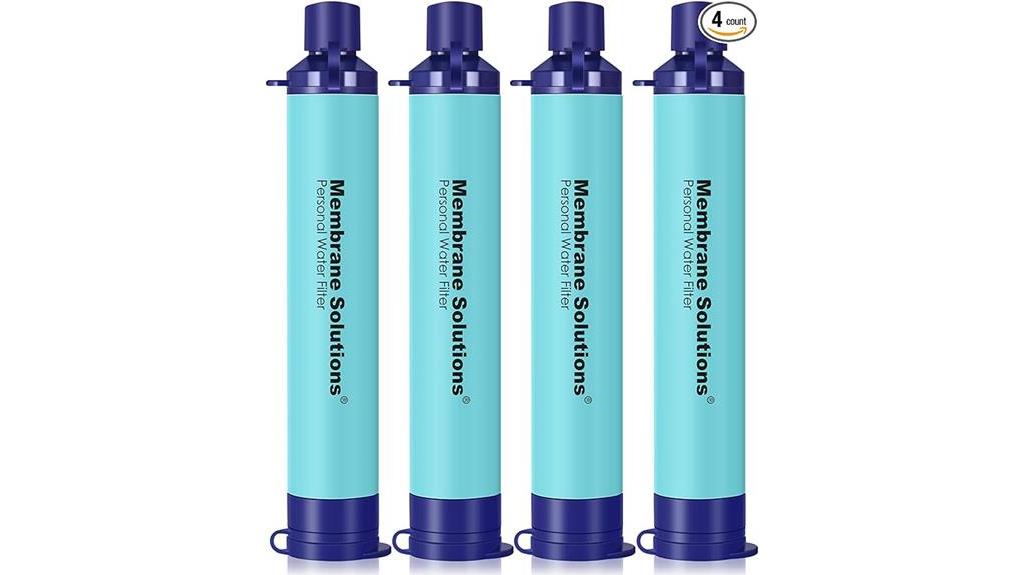
When it comes to emergency preparedness, the Membrane Solutions Straw Water Filter stands out for its portability and impressive filtration capabilities. At just 7.1 inches long and weighing only 2 ounces, I can easily slip it into my pocket or backpack without any hassle. This little powerhouse can filter up to 1,320 gallons of clean drinking water, making it a lifesaver during outdoor adventures or emergencies. Its 5-stage filtration system removes 99.99999% of harmful substances, ensuring I stay hydrated with safe water. Plus, it's made from durable, BPA-free materials, so I don't have to worry about contaminants. I've found it reliable and easy to clean, which adds to its appeal as an essential item in my emergency kit.
Best For: Outdoor enthusiasts, emergency preparedness planners, and travelers seeking a portable water filtration solution.
Pros:
- Lightweight and compact design makes it easy to carry in pockets or backpacks.
- Highly effective 5-stage filtration system removes 99.99999% of harmful substances for safe drinking water.
- Durable, BPA-free materials ensure safety and longevity of the product.
Cons:
- Some users report limitations on backwashing, which can affect the filter's longevity.
- Not suitable for filtering large volumes of water quickly, as it is designed for personal use.
- Requires regular cleaning to maintain optimal performance, which may be inconvenient for some.
LifeStraw Personal Water Filter for Hiking and Camping
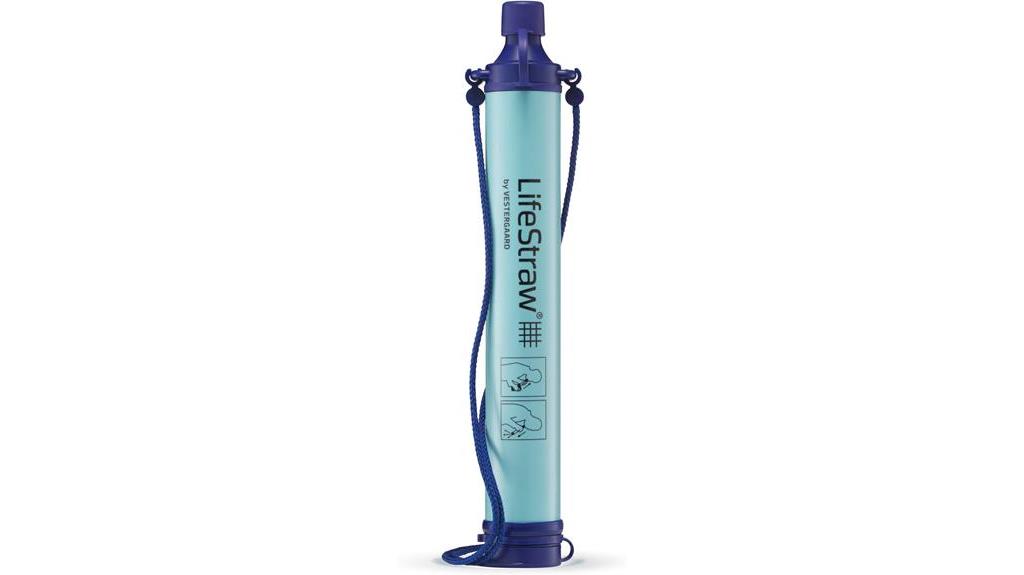
The LifeStraw Personal Water Filter is a must-have for anyone who enjoys hiking and camping, ensuring you can access safe drinking water from natural sources. I've found it incredibly reliable, as it removes 99.999999% of bacteria and 99.999% of parasites, giving me confidence in every sip. Its compact and lightweight design fits perfectly in my backpack, and I love that I can drink straight from rivers or lakes without any complicated setup. With the ability to filter 4,000 liters of water, it's built to last through my adventures. While it doesn't improve taste, it sure provides peace of mind when clean drinking water isn't guaranteed. For any outdoor enthusiast, the LifeStraw is truly an essential tool.
Best For: Outdoor enthusiasts, hikers, campers, and individuals in need of reliable access to clean drinking water from natural sources.
Pros:
- Removes 99.999999% of bacteria and 99.999% of parasites, ensuring safe drinking water.
- Compact and lightweight design makes it easy to carry in backpacks or pockets.
- No batteries or complicated setup required, offering quick hydration directly from water sources.
Cons:
- Does not improve the taste of water, which may retain natural mineral flavors.
- Limited to filtering water; does not provide other functionalities like hydration packs.
- Requires proper maintenance to ensure longevity and optimal performance.
Pro Water Purifier Water Filtration System for Camping and Emergency Preparedness
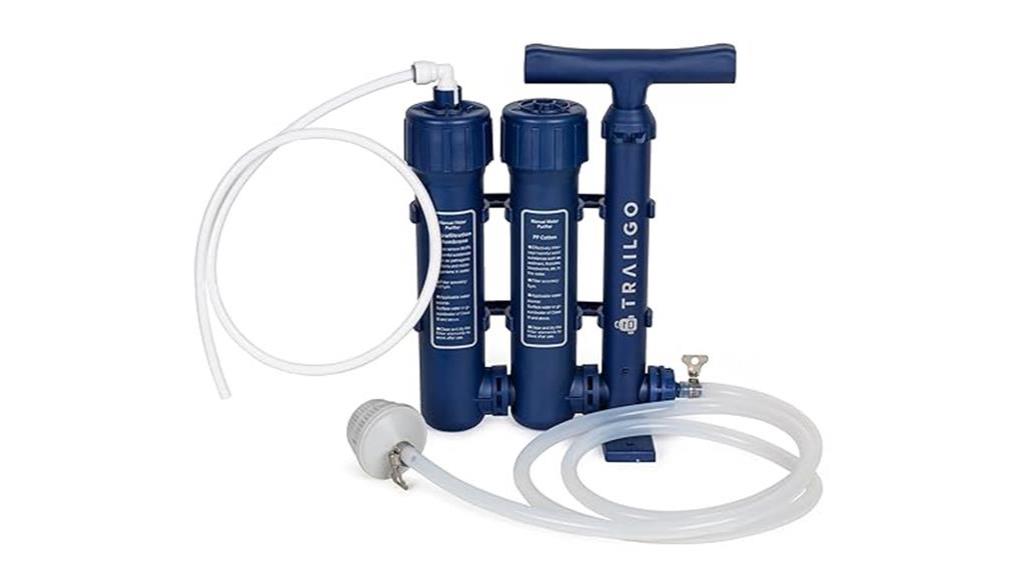
For those planning group camping trips or preparing for emergencies, the Pro Water Purifier Water Filtration System stands out as an essential tool. This high-volume hand pump filter delivers clean water quickly, filtering a gallon in about five minutes with a flow rate of 1.5L per minute. Its 3-stage filtration system removes 99.9% of harmful contaminants, ensuring safety for multiple users. While it's effective against solids, keep in mind it doesn't filter out viruses, so boiling water is a good extra safety measure. The durable, BPA-free plastic design makes it sturdy for outdoor use, and the included carry bag simplifies transportation. If you're gearing up for a group adventure or emergency, this purifier is a reliable choice.
Best For: The Pro Water Purifier is best for groups engaging in camping trips or individuals preparing for emergency situations where access to clean water is essential.
Pros:
- High flow rate allows for quick filtration, producing a gallon of clean water in about five minutes.
- 3-stage filtration system effectively removes 99.9% of harmful contaminants, ensuring safer drinking water.
- Durable and portable design makes it suitable for outdoor use, complete with a carry bag for easy transport.
Cons:
- Does not filter out viruses, necessitating additional measures like boiling for complete safety.
- Manual pumping may require effort, which could be challenging for some users over extended periods.
- Bulkier than personal filters, making it less ideal for solo backpacking or very limited space.
Survivor Filter PRO Hand Pump Camping Water Filtration System
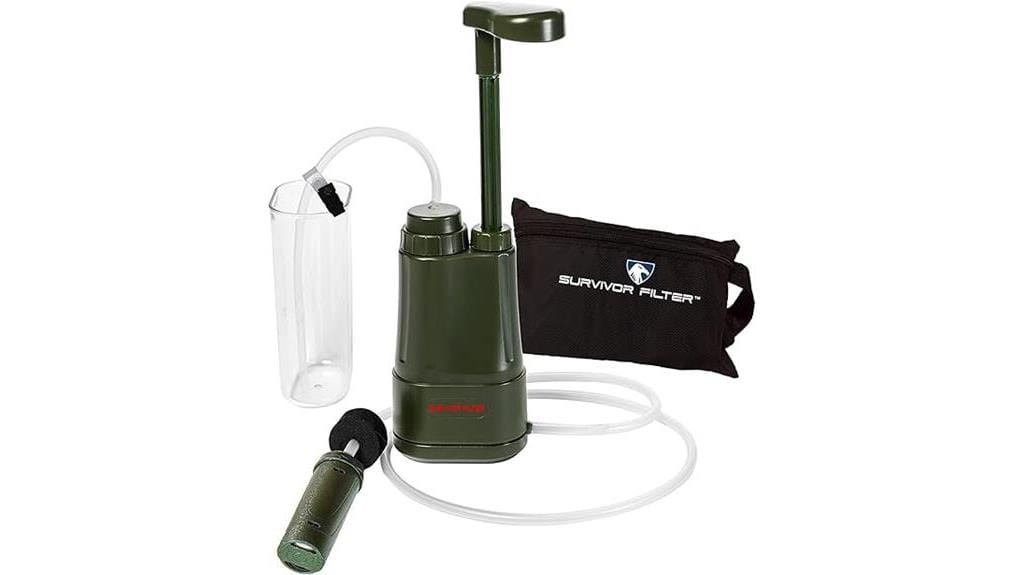
If you're a prepper looking for a reliable water purification solution, the Survivor Filter PRO Hand Pump Camping Water Filtration System stands out with its impressive capability to remove 99.999% of viruses and bacteria. Weighing just 12.8 ounces, it's compact and easy to pack for any adventure. I love its fast flow rate of 500ml per minute, which keeps my hydration needs met during hikes. Users rave about its effectiveness, providing clean-tasting water from streams and fountains. While pumping can be labor-intensive, especially for larger batches, the design is straightforward, and maintenance is manageable. Plus, the lifetime warranty offers peace of mind. Overall, this filter is a solid choice for anyone serious about water safety in the wilderness.
Best For: Preppers, campers, and hikers seeking a reliable, compact water filtration system for safe drinking water in outdoor environments.
Pros:
- Effective removal of 99.999% of viruses and bacteria, ensuring safe drinking water.
- Lightweight and portable design, making it easy to carry on outdoor adventures.
- Fast flow rate of 500ml per minute, providing quick hydration during hikes.
Cons:
- Manual pumping can be labor-intensive, especially for filling larger bottles.
- Inlet may float in fast-moving water, which can reduce filtration efficiency.
- Some users reported minor issues with hose connections and a slight rubbery taste from hoses.
Waterdrop Gravity Water Filter Straw for Camping and Travel
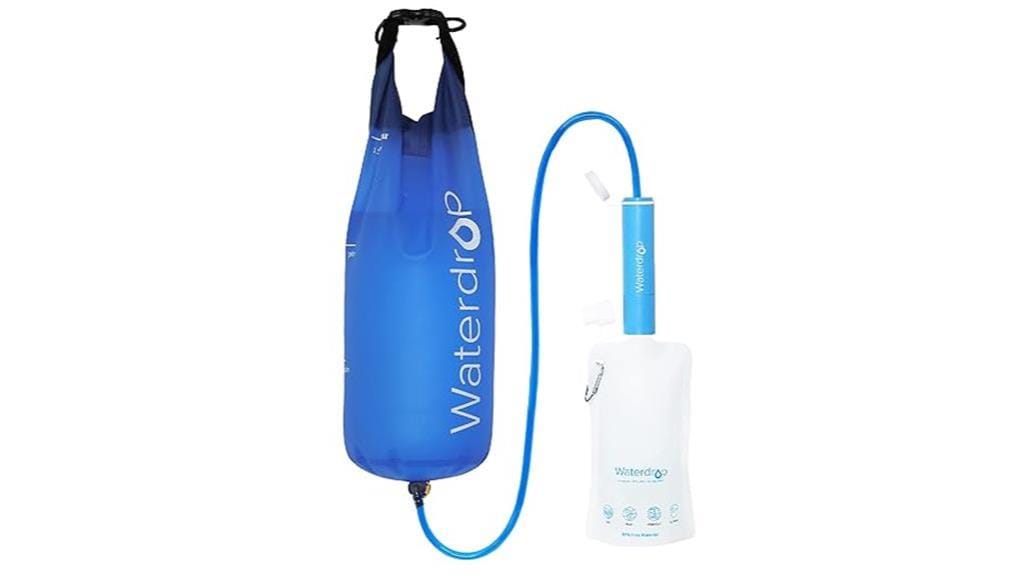
Designed with preppers in mind, the Waterdrop Gravity Water Filter Straw is perfect for anyone needing reliable access to safe drinking water in emergency situations or during outdoor adventures. This lightweight and portable filter straw uses a 5-stage filtration system, effectively removing chlorine, sediment, and bad taste, providing up to 1,400 gallons of safe drinking water. I love that it connects easily to water bags or bottles, making it versatile for any situation. While it filters about a gallon in 30 minutes, I've noticed it slows down in cooler temperatures. Overall, it's ideal for camping or hiking trips, and despite some minor user concerns, it's a solid choice for staying hydrated when water sources are scarce.
Best For: The Waterdrop Gravity Water Filter Straw is best for outdoor enthusiasts, campers, and emergency preppers seeking reliable access to safe drinking water in various environments.
Pros:
- 5-stage filtration system effectively removes chlorine, sediment, and bad taste.
- Portable and lightweight design makes it easy to carry on outdoor adventures.
- Versatile connections with water bags or bottles for convenient use.
Cons:
- Some users reported a slower filtration rate in cooler temperatures.
- Occasional chlorine-like taste noted by some users.
- Concerns regarding filtration efficiency claims, with discrepancies in reported percentages.
Factors to Consider When Choosing a Water Purifier for Preppers
When choosing a water purifier for prepping, you'll want to contemplate several key factors. Filtration efficiency ratings, portability, and the technologies used can make a big difference in your water safety. Plus, think about how compatible the purifier is with your water sources and how easy it is to maintain.
Filtration Efficiency Ratings
Understanding filtration efficiency ratings is vital for preppers seeking reliable water purification solutions. These ratings indicate the percentage of harmful contaminants—like bacteria and viruses—that a water purifier can remove. For ideal safety, look for purifiers with higher percentages, such as 99.99999%, which reflect greater effectiveness.
Many purifiers employ different filtration systems, including 3-stage or 5-stage processes, combining materials like activated carbon and ultrafiltration membranes. This combination enhances their purification capabilities. Some purifiers specifically target bacteria and protozoa, while others also filter out viruses, microplastics, and heavy metals, greatly impacting the safety of your drinking water.
The pore size of the filtration media is another important factor. Filters with a pore size of 0.1 microns can effectively eliminate most harmful particles, guaranteeing safe consumption. To verify that a water purifier performs as claimed, check its efficiency through independent testing standards such as EPA, NSF, or ASTM. These certifications provide confidence that the product will meet your needs in real-world conditions, helping you stay prepared and hydrated in any situation.
Portability and Weight
Filtration efficiency ratings are important, but just as essential is the water purifier's portability and weight. When you're preparing for emergencies, you'll want a lightweight option, typically weighing between 2 to 13 ounces. This makes it easy to carry in your backpack or even your pocket.
Compact designs, measuring around 7 to 12 inches in length, allow for hassle-free packing alongside your other survival gear. A portable water purifier should be designed for quick setup and operation, so you can access clean water efficiently without the burden of heavy equipment or complicated processes.
Look for models that offer versatility, like those that fit with water bags or bottles, enhancing portability during your travels or outdoor activities. Additionally, consider the construction materials; they should be durable yet lightweight, ensuring safety and ease of transport. BPA-free options are particularly important, as they offer peace of mind in various environments.
Filtration Technologies Used
Choosing the right water purifier involves evaluating the various filtration technologies available. Different purifiers utilize a range of methods, such as multi-stage systems that combine coarse filters, activated carbon, and ultrafiltration membranes. These systems effectively remove contaminants, guaranteeing you're drinking safe water.
For instance, a 5-stage filtration system can eliminate up to 99.99999% of harmful substances, including bacteria, parasites, and organic chemicals, while still retaining essential minerals. Some filters specifically target microplastics, filtering particles down to sizes as small as 0.1 microns, which assures high filtration accuracy.
You should also reflect on how the filtration technology impacts water taste and clarity. Effective systems reduce turbidity and enhance flavor, making your hydration experience more enjoyable. However, it's crucial to assess the specific contaminants each filter is designed to remove. Some may not be effective against viruses, which means you might need additional purification methods, like boiling, for thorough safety.
Water Source Compatibility
When selecting a water purifier, consider how well it can handle various water sources, like lakes, rivers, and streams. These environments often harbor bacteria, parasites, and sediments that can contaminate your drinking water. It's essential to choose a purifier that effectively filters out these harmful elements.
Pay attention to the filtration capabilities, focusing on its ability to remove specific contaminants such as viruses, bacteria, and microplastics. Not all purifiers are created equal, and their effectiveness can vary depending on the water source. Look for purifiers with smaller pore sizes, ideally around 0.1 microns, as they can eliminate harmful pathogens and guarantee safe drinking water from untreated sources.
Also, evaluate the purifier's compatibility with different water containers, like pouches or bottles, which makes access to clean water easier in the field. Finally, confirm that the purifier can manage the turbidity levels of your chosen water source. High turbidity may necessitate pre-filtration to boost the purification process's effectiveness. By considering these factors, you can select a water purifier that meets your prepping needs.
Maintenance and Cleaning Ease
After ensuring your water purifier can handle various sources, you'll want to think about how easy it is to maintain and clean. Regular maintenance is essential for ideal filtration performance and longevity. Look for models that offer user-friendly cleaning options, like backwashing or simple disassembly, which make upkeep a breeze.
Some filters require specific cleaning tools, such as backwashing syringes, to effectively remove accumulated contaminants and maintain flow rates. Consider filters with replaceable cartridges or components; these can greatly reduce your long-term maintenance efforts. You'll appreciate being able to swap out worn parts instead of servicing the entire unit.
It's also important to check the accessibility of cleaning instructions and customer support resources, especially for complex systems that may need occasional repairs or replacements. Portable designs that allow for quick cleaning enhance your convenience during outdoor activities, minimizing downtime and ensuring a reliable water source. Ultimately, choosing a water purifier with straightforward maintenance will help you stay prepared and hydrated, no matter the situation.
Frequently Asked Questions
How Often Should I Replace My Water Purifier's Filters?
You should replace your water purifier's filters based on the manufacturer's recommendations, usually every 6 to 12 months. If you're using it frequently or notice a drop in water flow, it might need changing sooner. Check the filter indicator if your purifier has one; it'll let you know when it's time. Regular maintenance guarantees your water stays clean and safe, so don't overlook this important step in your water purification routine.
Can I Use These Purifiers for Seawater?
You can't use standard water purifiers for seawater. These purifiers are designed to remove contaminants from freshwater sources, not the high salt content in seawater. If you need to desalinate water, look for specialized desalination devices. These are specifically built to handle the salt and make seawater safe for drinking. Always check the manufacturer's guidelines to guarantee you're using the appropriate equipment for your needs.
Are These Water Purifiers Effective Against Viruses?
Imagine a fortress of safety, where each drop of water is a crystal-clear treasure. When you ask if these water purifiers are effective against viruses, the answer is a resounding yes. Most of them use advanced filtration and UV technology, acting like vigilant guards against harmful pathogens. However, make sure to check the specifications, as not all purifiers are created equal. Trust the right one, and you'll drink worry-free, even in uncertain times.
What Is the Lifespan of Each Water Purifier?
When considering the lifespan of water purifiers, it really depends on the type and brand you choose. Generally, filter-based purifiers can last anywhere from 6 months to several years, depending on usage and maintenance. UV purifiers often have a lifespan of around 10,000 hours of use, while reverse osmosis systems may last longer with proper care. Always check the manufacturer's guidelines to guarantee you're getting the most out of your investment.
Do Water Purifiers Remove Chemicals and Heavy Metals?
Imagine sipping water that sparkles like a mountain stream, free from harmful chemicals and heavy metals. Most water purifiers do remove these contaminants, but it varies by model. Activated carbon filters excel at trapping chemicals, while reverse osmosis systems can eliminate heavy metals. It's essential to choose a purifier designed for your specific needs, ensuring you're sipping safe, clean water every time. That way, you can enjoy peace of mind with every rejuvenating gulp.
Wrapping Up
In a world where clean water can feel like a luxury, staying prepared is your best defense. The right water purifier not only guarantees you're hydrated but also gives you peace of mind during uncertain times. Whether you're trekking through the wilderness or bracing for emergencies, these top picks are your trusty companions. So gear up, stay sharp, and let these purifiers be the unsung heroes in your preparedness journey. After all, a sip of safety is always worth it!

Hi, I’m Charlie, and I cover all things laundry here at Appliance Mastery.
I’ve spent over eight years working on washing machines, dryers, and dishwashers. I also have a degree in mechanical engineering, which helps me understand how these appliances really work.
I try to make every guide clear and practical. If you’re stuck with a noisy dryer or a leaking washer, I’ll help you figure out what’s wrong and how to fix it.
